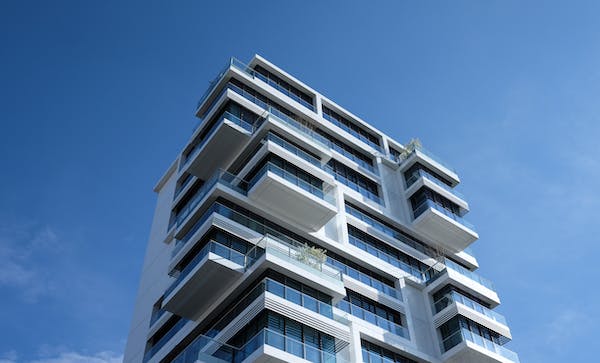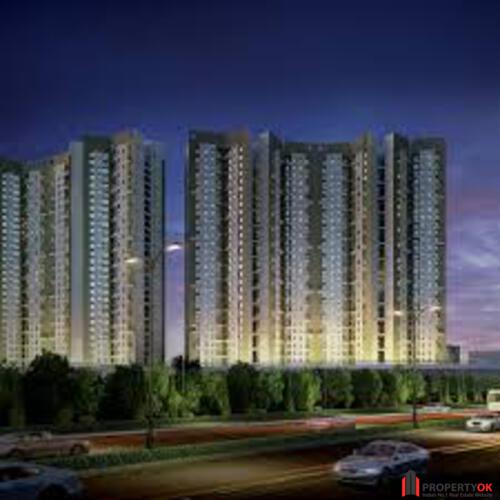
The supply of products and services from the manufacturer to the client is subject to a single tax known as GST. GST is essentially a tax only on value addition at each level because credits of input taxes paid at each stage will be in the stage of value addition. According to Schedule III of the Indian Constitution, land sales were not considered the supply of goods or services before this time, so there was no GST.
However, as of this writing, the Government of India has begun to apply GST on real estate to buildings that fall under the categories of affordable residential housing projects or non-affordable residential housing projects at rates of 1% and 5%, respectively. Therefore, the question “What is the GST on real estate?” has been thoroughly covered in this article.
Don’t miss out on the best deals and properties. Follow PropertyOK and be the first to know about new listings and upcoming projects.

GST Rates on Different Real Estate Sectors:

Various GST-related questions exist. The GST on real estate is one such major question. One of the key economic sectors in every nation is the real estate, particularly in India, where it has recently attracted attention. This article will analyze the effects of GST on the real estate sector, specifically on the residential housing sector.
Some of the activities that are considered supplies for charging GST on real estate include the following:
- Construction of a residential complex, a building that includes a complex, or a building that is intended for sale to a buyer, in whole or in part, barring circumstances in which the full consideration has been received following the issuance of a completion certificate by the appropriate authority or following the building’s initial occupancy.
- A contract for the building, fabrication, completion, erection, installation, fit-out, improvement, modification, repair, maintenance, renovation, alteration, or commissioning of any residential property is referred to as a “works contract.” The execution of a works contract may require the transfer of property in goods (whether as goods or services or in some other form).
Also Read: RERA-LIZE YOUR RIGHTS: A STEP-BY-STEP GUIDE TO FILING RERA COMPLAINT
The following property GST rate will be in force as of April 1, 2019, and it will apply to construction services that involve the transfer of real property:
- Affordable Residential Apartments:
o 1% without ITC on total consideration for residential apartments.
o Aside from affordable residential apartments, 5% of the total consideration was made without ITC.
- Residential Real Estate Project (RREP):
o 5% of the overall consideration for commercial apartments (stores, godowns, offices, etc.).
o 12 percent of overall consideration is allocated to projects other than Residential Real Estate Projects (RREP) without ITC.
These are the few things to keep in mind:
- All fees or monies collected from the buyer by the developer are included in the total amount collected for the purpose of calculating the Rs. 45 lakhs threshold. The value, however, shall exclude the following:
o The statutory authority is responsible for collecting stamp duty and registration fees.
o Maintenance fees or deposits for maintaining the communal areas and infrastructure.
- The value of the land will be regarded as accounting for one-third of the entire contract value and will be excluded from GST.
- At least 80% of the total value of inputs and input services must be obtained from registered suppliers in order to qualify for the higher GST rates.
When it comes to the GST on a construction based on contracts, it is a composite supply because it is a building where both products and services are provided. Principal supply is regarded as a service supplier to impose GST.
The works contract only includes the construction service. Therefore, a 12 percent tax must be paid when constructing a residential unit in different housing projects or elsewhere other than housing projects. Any time a contract is further subcontracted, a 12 percent GST charge is additionally applied.
According to the GST Council‘s explanation on the 19th of March, there is certain tax freedom or flexibility on GST for builders and developers. Builders and developers can charge GST on real estate at the old rates with input tax credits or the new rates without them.
GST on Housing Schemes:

Affordable housing will be defined as residential properties with a total carpet area of up to 60 square meters (roughly 645 square feet) in metropolitan cities like Bengaluru, Chennai, Delhi NCR, Hyderabad, Kolkata, and Mumbai and 90 square meters (roughly 960 square feet) in non-metropolitan areas with a price range up to INR 45,00,000 (both for metro and non-metropolitan areas). For these homes, the actual GST rate will be 1%. (without input tax credit).
Read More:TOP FLAT SCHEMES IN MAHARASHTRA
Rate of GST in Flat Registration:

On sales to ready-to-move-in homes, GST is not a tax. A property is labeled as “ready to move in” once construction is finished and the completion certificate has been received. The GST does not cover these types of property. Only sales of under-construction properties still being built and have not yet received a completion certificate are subject to GST.
Regarding GST on real estate for builders, when a deal is reached with a builder for the construction of floors or flats (other than in approved housing projects) and some of the floors or flats are given to the builder as payment for the construction, GST does not apply to the undivided share of the land but is taxed at an 18% rate on the builder’s transfer of the floors or flats to the land owner.
Also Read: THE IMPACT OF RERA ON BUILDERS IN THE REAL ESTATE SECTOR OF INDIA
No GST is applied to rental revenue as long as residential properties are rented out. However, if such a property is rented out for business reasons or if the annual rent exceeds Rs. 20 lakhs, 18 percent GST would be charged. The GST rate is 18% when renting out business buildings. On the sale of the Plot, there will be no GST. A land with any structure on it, however, would be subject to GST.
GST Turnover:

The Central Government has agreed to offer real estate developers two threshold limits for GST registration: Rs. 20 lakhs and Rs. 40 lakhs. However, because each State’s revenue is also based on the GST, each State Government must decide on the threshold limit within a week. As a result of this decision, different States will eventually have varying GST threshold levels. Service providers must continue registering for GST whenever their annual revenue exceeds Rs. 20 lakhs and Rs. 10 lakhs for the Special Category States.
The total turnover is a necessary condition for GST registration. The GST laws specify that any turnover up to Rs. 20 lakh is entirely exempt from GST, along with Rs. 10 lakhs for special category states (except for Jammu and Kashmir, which is completely exempt from registration). Any turnover exceeding these amounts, however, is required to be registered. The value of the operations carried out by all the entities of the concerned individual on a pan-India basis is added together to get the total turnover.
As the government requires, eleven states have been given special category status. Which are:
- Arunachal Pradesh.
- Assam.
- Jammu and Kashmir.
- Manipur.
- Meghalaya.
- Mizoram.
- Nagaland.
- Sikkim.
- Tripura.
- Himachal Pradesh.
- Uttarakhand.
Conclusion:
In conclusion, GST on real estate transactions in India can be a complex and confusing topic for many. However, by understanding the GST rates, exemptions, and compliance requirements, one can ensure that their real estate transactions are smooth and hassle-free. It’s always advisable to seek professional advice if you have any doubts or queries regarding GST on real estate in India.
The selling contract between the buyer and the developer will typically include a “Change in Law” language that also addresses changes in the tax rate. As a result, the buyer might not be obligated to alter the contract. However, as a precaution, the buyer should review the contract’s terms again. Stay informed and stay compliant.
Frequently Asked Questions:
- Is there any GST on property purchases?
In India, buyers of unfinished bungalows, apartments, and flats pay 5% GST for unaffordable housing and 1% GST for affordable housing. Purchases of real estate land are subject to the GST.
2. Is GST applicable for flat purchases?
While non-affordable housing projects charge buyers a 5 percent GST, affordable housing projects only charge 1%.
3. Who pays the GST, the builder or the buyer?
On the remaining two-thirds of the contract’s value, the developer is obligated to pay the GST. This is regardless of whether the land’s actual worth is separately stated in the building contracts.

 Thank You
Thank You




